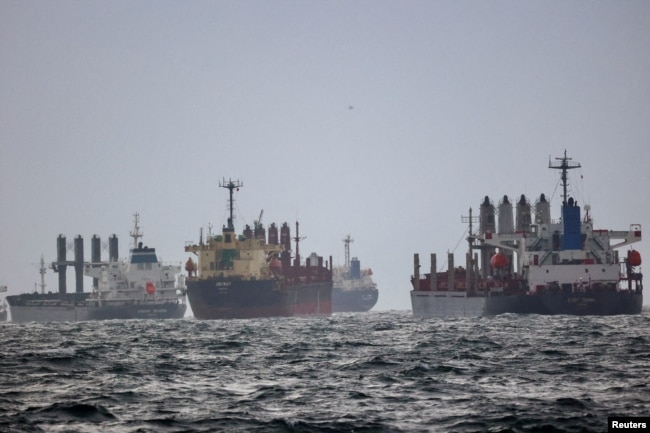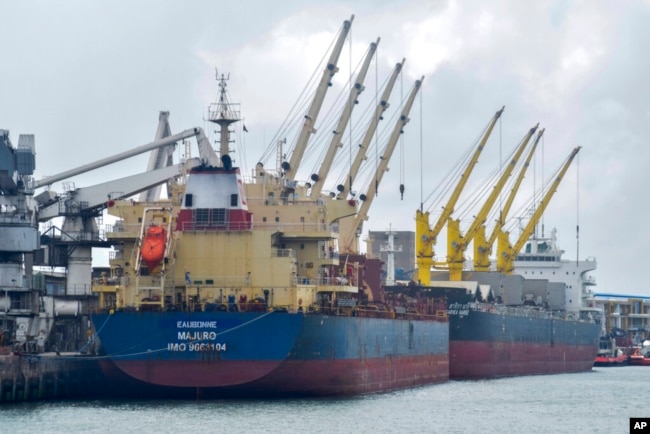The UN has no backup plan if Russia withdraws from the grain deal

The United Nations says it has no backup plan if Russia pulls out of the deal that allows Ukraine to export grain to international markets and has helped facilitate Moscow’s grain and fertilizer exports.
“There is no Plan B for the Black Sea,” U.N. spokesman Stephane Dujarric said in response to questions about what will happen if Russia makes good on threats to withdraw from the deal on May 18. “There is the Black Sea. We can’t move the ports. We can’t move the sea. We can’t move the Bosporus [Strait in Turkey].”
Since it was signed on July 22 in Istanbul, the Black Sea Grain Initiative has facilitated the safe export of more than 30 million metric tons of grain and other foodstuffs from three Black Sea ports in Ukraine to global markets.
A corresponding Memorandum of Understanding between Russia and the United Nations has made inroads in easing concerns of anxious banks, insurers, shippers and other private-sector actors about doing business with Russia. But Moscow has repeatedly complained that it is not benefiting enough from the deal.
Moscow is defending “Russia’s national interests, its agriculture producers, producers of fertilizers,” Russian Deputy Foreign Minister Sergei Vershinin said. “An initiative that brings unilateral benefits can hardly be recognized and confirmed by all.”
However, U.S. Ambassador to the United Nations Linda Thomas-Greenfield told reporters Thursday, “Russia is exporting just fine. It is exporting grain and fertilizer at the same levels, if not higher, than before the full-scale invasion.”
“Russia’s threats are about money and power. The more Russia obstructs Ukraine’s exports, the higher prices go, and with Russian exports moving well, they are making more profits,” she said.
Russia has also forced a slowdown of Ukrainian grain exports via the deal, putting the brakes on mandatory ship inspections.
Data from the Istanbul-based Joint Coordination Center, which oversees inspections, shows that inspections of ships headed to Ukraine and departing the country have substantially declined from a high in October of 4.4 inbound inspections daily and 6.3 outbound, to 1.4 inbound and 1.5 outbound daily inspections so far in May.
“In classic form, the Russians are playing with procedures in the Black Sea Grain Initiative,” said Ambassador Jim O’Brien, who heads the State Department’s Office of Sanctions Coordination. “What they have done is not allow ships to register and then not inspect them.”
The JCC says there are currently 26 outbound ships in Turkish waters with more than a million metric tons of grain and foodstuffs. The Ukrainians have informed them that 62 more are waiting to move to Ukrainian ports to collect exports.
On Thursday, the four parties to the deal — Ukraine, Russia, Turkey and the United Nations — met in Istanbul to discuss the grain deal’s future.
The United Nations has emphasized the importance of the Black Sea Grain Initiative to keep global food prices stable and food available and affordable, especially to the poorest nations. More than half of the Ukrainian grain exported via the deal has gone to developing countries.
“It’s clear if this initiative cannot continue, and its package cannot continue, it will have a negative impact on global food security, on global food prices,” U.N. spokesman Dujarric told reporters. “It’s important that everyone who is involved in this, directly or on the periphery, live up to its responsibilities.”
Read also
Black Sea & Danube region: How agri business can generate money in 2026
Canada’s total wheat production nears 40 mln tons
Ukrainian disk harrow Velly will operate in South America
Malaysian palm oil exports are declining, while Indonesian palm oil exports are gr...
Vietnam eases access to GM feed materials to curb rising feed costs
Write to us
Our manager will contact you soon





